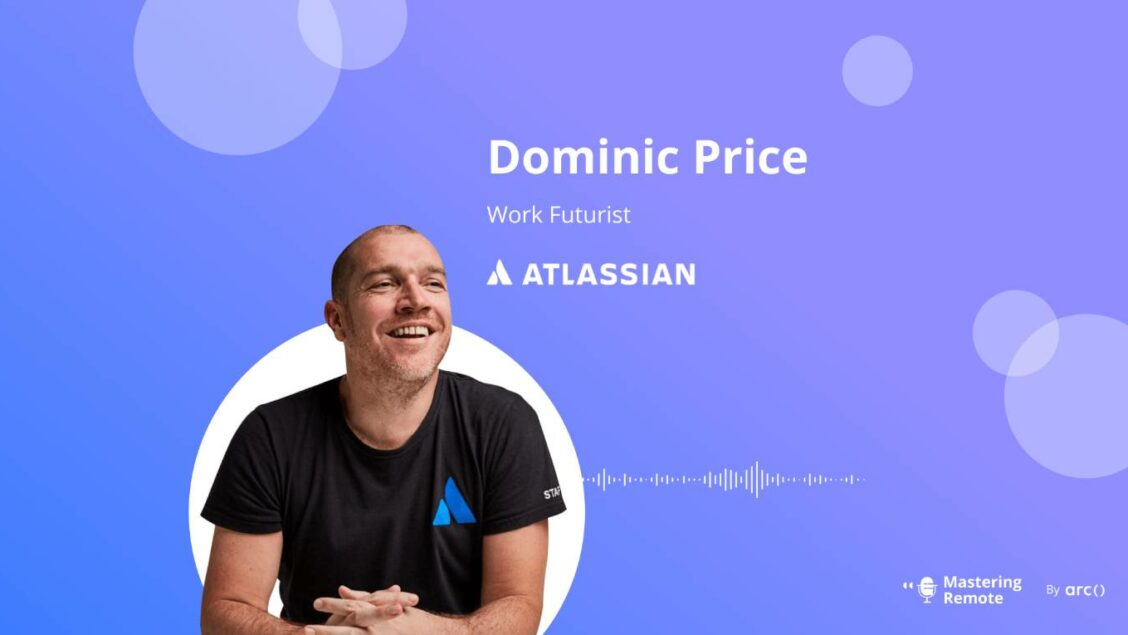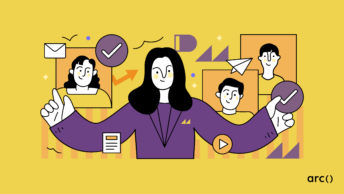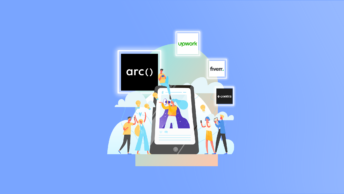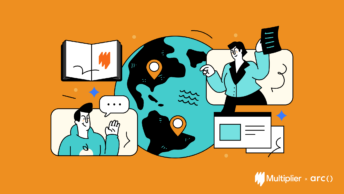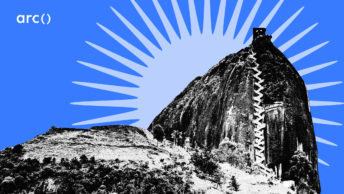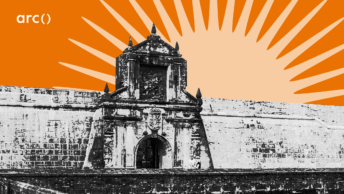Crisis leadership is tough, especially when remote. So how can leaders navigate unpredictable times more effectively?
This episode of Mastering Remote covers:
- Practical exercises to become a more effective leader,
- Ways to keep old habits from holding yourself and your team back,
- How to turn experimentation into a core part of your organization’s DNA,
- Why Atlassian decided to become a hybrid organization.
About Dom Price
Dom Price is the resident work futurist at Atlassian. He is passionate about discovering healthy and effective collaboration patterns that allow teams to do the best work of their lives – because a fool with a tool is still a fool.
Read on for a few of the main takeaways to help you with leading through uncertainty. Here’s what we’re going to cover:
- Trying To Make Remote Like The Office Is Exhausting Everyone
- Helpful Empathy vs Ruinous Empathy While Leading Through Uncertainty
- Personal Vulnerability And Experimentation Matters for Crisis Leadership
- How To Do Leadership Health Monitoring
- Values Make Or Break The Hiring Decision
- Storytelling And Internal Kudos Counts
- Your Remote Processes Probably Aren’t As Good As You Think They Are
- Personalization As A Hybrid Office Strategy
- How To Have Future-Focus
- Crisis Leadership Doesn’t Have To Be Lonely
- Rapid-Fire Questions
Looking for top talent fast? See how Arc can help you:
⚡️ Find developers, designers, marketers, and more
⚡️ Freelance or full-time remote + fully vetted
⚡️ Save up to 80% with global hires
Hire top talent with Arc risk-free →
Trying To Make Remote Like The Office Is Exhausting Everyone
In 2020, many companies have been forced to go remote. The problem? Not already having remote-optimized processes in place means that many of these companies are trying to replicate the in-office experience. In practice:
- People are now working longer hours, as it’s taking longer to get things done
- Small things are turning into half hour meetings
- Home life is getting in the way
More reading: check out Atlassian’s recent report on “Reworking Work.”
Helpful Empathy vs Ruinous Empathy While Leading Through Uncertainty
Dom spoke about Kim Scott’s book Radical Candor, and how its concept of “ruinous empathy” is playing out during COVID work-from-home:
I’ve seen ruinous empathy where it’s like, [Christine’s] got a lot on right now. And so I’ve got this information. I’m going to hold it back from you because I don’t want to worry. The problem is: […]you start to wonder why I’m not sharing it, if you done something wrong… you fill in the gaps, make it up for yourself. You make it way worse than any information or feedback I can give you. And ruinous empathy is happening on steroids right now. People are buffering from each other to try and help them. Actually, it’s making things worse…
Dom’s suggestion for leaders finding themselves in this situation is to simply ask people: “Is there anything I can do to help?”
Just that small step can go a long way in building a meaningful connection with your people. And I think every leader has the potential to do that. Because it doesn’t cost anything. There’s no business case. There’s no approval. It’s not about title or role. It’s just about caring for the people around you.
Personal Vulnerability And Experimentation Matters for Crisis Leadership
Bringing your personal vulnerability to work is something that Dom thinks is a quality of a good leader. A thought experiment that Dom uses to reflect on himself is the “4Ls”. Every 90 days, Dom reflects on what he:
- Did, that he “loved,”
- Did, that he “lost,”
- Wishes he was doing, but isn’t (what he “longs” for), and
- “Learned” during that time period.
This reflective framework gives him the structure to find new insights on his behavior, including e.g. seeing new habits/rituals to change or remove. This can free up his time to be reinvested into something that will have a long-term payoff.
This reflection can also help you connect with your teammates in an authentic way:
I learned to share the lessons around experimentation. And suddenly you feel this momentum build not only because you’re evolving yourself, but you’ve got a mechanism and conversation to share that vulnerability with people. And I think that goes exceptionally well when people can tap into that and do it genuinely.
How To Do Leadership Health Monitoring
Part of Atlassian’s team playbook is using Health Monitors. This is a structured way to take the pulse of team health: the team will read out the eight attributes of a healthy team, then vote on them, one-by-one. This is done silently via thumbs up, thumbs sideways, or thumbs down. And then the outcome is discussed:
Everyone sees the world through a different lens. What did you see that made you vote that way? And then as a team, which one area do we want to focus on getting better at.
According to Dom, it’s a natural process for team improvement:
And what it saves the leader doing is trying to sell the vision, right? You don’t have to say to people: here’s this big sales pitch on why we need to change. You get them to self assess and go, “Ah, yeah, no, we’re not great at this. We could be better. Here’s the thing we could do to change.”
(Another recent team exercise was jointly painting a picture of “what does the world look like in 2025, and what was our contribution to making it so good? And then we worked backwards from that to today.”)
Values Make Or Break The Hiring Decision
Atlassian has a values interview as part of its hiring process — and it’s not just for show. As Dom puts it:
You can be the most intelligent technical person in the world. But if you’re not a nice person, you’re not gonna get a job.
New starters are also taught about values during their onboarding process: they’re not just here to learn, but here to drive change.
Storytelling And Internal Kudos Counts
Recognizing team-members’ achievements — particularly around experiment and change — is a core aspect of Atlassian’s workplace culture. They use a system called “Kudos” to publicly recognize and reward people. This platform allows members of the Atlassian team to select a teammate, select a reward, and notify them of the company value that they’ve lived. After all, celebrating positive behaviors is a great thing!
Dom says that Atlassian also has an “amazing culture around storytelling.” Whether it’s recent successes or learnings, anybody and everybody is welcome to share their knowledge with the rest of the team.
Your Remote Processes Probably Aren’t As Good As You Think They Are
I think how our IQ and EQ on remoteness got a lot better. […] We probably thought we were good at remote work. And then we acquired Trello and they’ve been built by way.
Although Atlassian has been experimenting with remote work for a while, they still learned a lot after acquiring 100% remote company Trello. One example: with videocalls, “if one person dials in, everyone dials in.” This rule helps level the playing field between in-office and remote team members. For the in-office team, they will all go into separate rooms, and separately dial into the videocall.
Atlassian has also been putting more emphasis on asynchronous communication. One example, provided by Dom, is:
As we were documenting our strategy for the next financial year […] we documented those as videos. We save time in people’s calendars, but we said: “Here’s everything to watch. Both pages and tables and documents and background information and videos. We think it’ll take X amount of hours. We save that time, but you can watch these whenever you want.”
By making the information asynchronous and online for everyone, nobody has the advantage of being able to see it “live,” and nobody is disadvantaged by being asked to attend a middle-of-the-night meeting.
So we’re pushing way more of our meetings, formats of communications, to be asynchronous and getting better at documenting them and storytelling. That means that people can consume them in a time that works for them. Not just a time that works for us.
Personalization As A Hybrid Office Strategy
Atlassian has chosen a future as a hybrid company: with flexibility for people to be based in an office, or working remotely. Hybrid-remote is one of the hardest remote models to employ successfully, as it requires a constant balance of processes and priorities between the two types of team members.
The decision to go hybrid was made after surveying the organization’s employees:
We also already had a hypothesis that the time of one size fits all has gone. And actually what we’re seeing is the need for mass personalization[…] So the idea you’re having a singular policy that works for everyone when you’ve got 5,000 people[…] Singular policies don’t scream at flexibility or diversity or inclusion; they scream of “here’s one way of doing it, and we’re going to force it on you.” And that just doesn’t sit right with us.
The result of this thinking was that personalization and multiple workspaces/location agnostic work was the best fit for the team. However, Atlassian is still experimenting with how this is going to work. And, as Dom told us:
As soon as we get any level of success, we’re going to share it with all of our customers, because we believe that we have to do it first so that our customers can benefit second.
Dom personally does his best deep work at home, but prefers in-office for collaboration, social connection, and learning. After all, Dom says:
We’ve all got different learning and communication styles. Let’s embrace that.
How To Have Future-Focus
Dom believes that unlearning and adapting are critical skills for leaders. While it’s one thing to acquire new knowledge, sometimes there’s the need to unlearn information as well — particularly to avoid being stagnant as a business.
How do you pay homage to the past? How do you learn from it, how do you ensure that you’re not anchored in the past? How do you find ways of ridding yourself of historical knowledge, rituals, habits, things that aren’t going to pay a dividend anymore? Release those thank them. We often talk about having celebrations for things of the past; even having a wake for them. And you celebrate them, you go: “Cool. Now that’s gone, right. Let’s focus on the feature blank piece of paper. What does the future look like? What are the principles, philosophies that we care about, and how do we build for the future?” And that just gives you that space and time and freedom to genuinely lean into it.
Dom recommends this kind of thinking for companies interested in disrupting themselves from within.
Crisis Leadership Doesn’t Have To Be Lonely
2020 is a hard year for everyone — and this includes organizational leaders. Managing during times of crisis is a different skillset from managing in normal times.
Dom’s advice for leaders right now:
Take some time out for themselves. Like, you’ve got to put your own oxygen mask on first, before you help anyone else… you gotta be the best version of yourself for that.
Another tip from Dom is to understand that leadership doesn’t have to be exclusive or lonely:
I think it can be very inclusive when we take ego and put it to one side, and just open up and share stories. And leaders that do that genuinely become a force multiplier in their organization. They don’t think about process and management and control; they think about influence, they think about people, and they think about inspiration and it’s a very different mindset.
According to Dom, leaders who are successfully implementing this mindset right now:
[…]Are actually helping their teams navigate out of this crisis, this “war time”, and building a new “peace time” that’s different from the past. They’ve acknowledged it, they’ve paid homage to it, but they’re not holding their breath, waiting for the old normal to return. They’re getting on with building a new, better normal. And they’re embracing that uncertainty.
Rapid-Fire Questions
How do you like to take a break when working? Digital detox — turn off email, Slack, etc. Preferably go travelling.
What book changed your life? Dom previously read psychology books as a teenager. These days, he prefers reading fiction, because they allow his mind to “wander and be curious.” He particularly likes Lee Child books.
What’s your favorite remote work productivity hack? Dom doesn’t actually like productivity hacks. But if he’s forced to choose: swapping one meeting a day from being a videocall to being a phone call. This gives his brain a break, and he’s found he engages in a different way on the phone.
(He also has a end-of-day remote work trick: listening to music with a cup of tea on his balcony as the sun sets. By the time he’s returned, his lounge has mentally-transformed from his “workplace” back into his “lounge”.
You can also try Arc, your shortcut to the world’s best remote talent:
⚡️ Access 450,000 top developers, designers, and marketers
⚡️ Vetted and ready to interview
⚡️ Freelance or full-time


